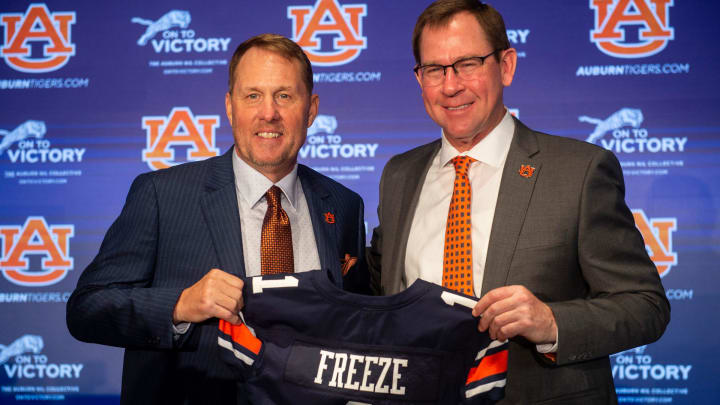Auburn AD Says ‘Really Difficult Decisions’ Coming With Revenue Sharing

Auburn athletic director John Cohen can’t say when and can’t say how but he knows hard choices are coming in a world when it comes to sharing revenue with its student-athletes.
Why? Because he knows where the money is coming from.
“Is it going to come from budgets already in our athletic department,” Cohen said to the Associated Press Sports Editors Southeast region meeting in Birmingham. “Yes. It has to. We’re going to have make some really difficult decisions.”
Like cutting sports? Cohen doesn’t want to. He has 21 of them and with the House vs. NCAA settlement still in need of approval by a judge, all he can do right now is plan for something that isn’t finalized yet.
It could mean roster limits for sports like football, which only has 85 scholarship spots but takes on dozens of walk-ons each year.
Reporting by AL.com puts into stark contracts those potential hard choices and the slim margins of a large athletic department like Auburn.
The Tigers set a record for revenue in their 2023 fiscal year — $195,301,922. But that’s revenue. Auburn did turn a profit, but only by $3.2 million.
If the Tigers have to pay student-athletes up to $22 million per year as part of the House settlement, one doesn’t need a degree in math to figure out that leaves a nearly $19 million deficit — and that’s before back-payments to other student-athletes as part of the settlement.
Cohen won’t be the only one grappling with this. Just in the past couple of weeks other athletic directors have talked about the challenges ahead and how they’re planning.
Nebraska Cornhuskers athletic director Troy Dannen told members of the 1890 Collective, which supports his student-athletes, that the Huskers had already set the revenue-sharing money aside in their next budget, assuming House will be approved.
Minnesota athletic director Mark Coyle hasn’t made decisions yet, but he’s communicated with his coaching staff that “tough decisions” may be coming.
Temple athletic director Arthur Johnson may face a different decision — whether or not to share revenue with student-athletes. Schools can opt-in or opt-out. Opting out could put Temple at a competitive disadvantage. But the Owls may not have the funds to compete if they opt in.
Cohen stressed that he can’t make decisions until he has a better idea of the final settlement, and he won’t know that until it’s approved.
“None of us wants to take anything away from any of our sports,” Cohen said. “But there’s these challenges and these laws that are colliding and we’re in the middle of it. That part’s not fun. But we do recognize that this is a new frontier.”
